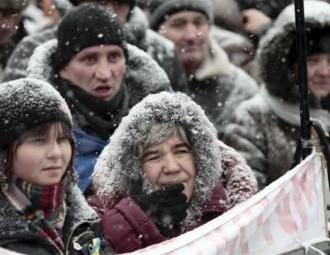Andrei Yahorau: Growth temperature of the Belarusan civil society is low

Despite the seeming activity Belarusan civil society is developing very slowly, the results of the monitoring conducted in Belarus during the last two years show.
Program monitoring “Situation and development of Belarusan civil society” is being conducted by the Centre for European Transformation since April 2011. It is aimed at tracking the dynamics of the circle of civil society organizations working in the field of democratic developments’ changes through specific actions, advocacy-campaigns, human rights protection, and system of organizational development.
The results of the monitoring were presented on October 8 in Minsk. As its authors, who are Andrei Yahorau and Andrei Shutau, explained, the presented analysis is based on monitoring of the media, analytical materials and normative documents, monitoring the terms of NGOs’ activity and law enforcement practices, as well as special analysis of civic initiatives. The results obtained allow assessing the situation in the processes in the Belarusan civil society development and setting priorities for further development. Andrei Yahorau, the director of the Centre for European Transformation, told EuroBelarus Information Service about the results of the research:
- During the presentation of the monitoring you’ve said that the research showed that the growth temperature of the Belarusan civil society is low. Can you explain, what you’ve meant by this?
- Despite the numerous actions and campaigns organized by the Belarusan civil society, there was no considerable change in the situation. And it caused the low temperature of its development.
- What is the reason for the stop in the development of the civil society?
- Two factors contribute to that: first include inner aspects of development connected with coordination of efforts, cooperation between organizations and revising the actions done by them. I.e. changing routine and ineffectiveness to some new actions requires certain resources in analytics, thinking, and research to be invested into the development of the civil society. There is some drawback in it, which doesn’t allow any change in the civil society structures, as change is only possible from inside, at the expense of the inner sources for growth. And the second factor includes external aspects, which are unfavorable for Belarus.
- Can we somehow influence and change these factors?
- For that we should involve ourselves in the inner development of organizations, to get ourselves engaged in self-determination, will, thinking – the things which are dependent on the civil society and free people. Inner development depends only on the members of the civil society organizations, not on the external factors, state aid or the absence of such.
- Will this monitoring go on in future?
- Yes, though it will be somewhat different, as we decided to change the methodology. It is going to have certain aspects in focus.
- What are the main conclusions that can be drawn from the results of the monitoring?
- The purpose of the monitoring is to orientate civil society actors. That is why, perhaps, conclusions made by different actions can differ. If we speak on the part of the National Platform of the Eastern Partnership Civil Society Forum and on the part of the International Consortium EuroBelarus, general results of the monitoring are unsatisfactory. And, of course, it would be good to intensify and increase the effectiveness of the Belarusan civil society work.
-
03.01
-
07.10
-
22.09
-
17.08
-
12.08
-
30.09



























